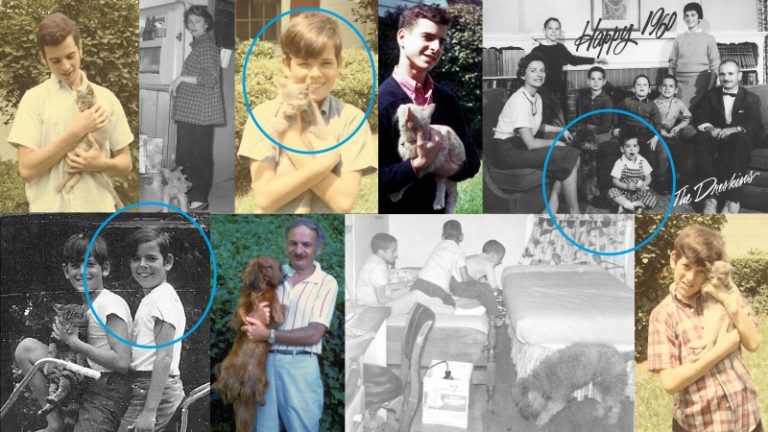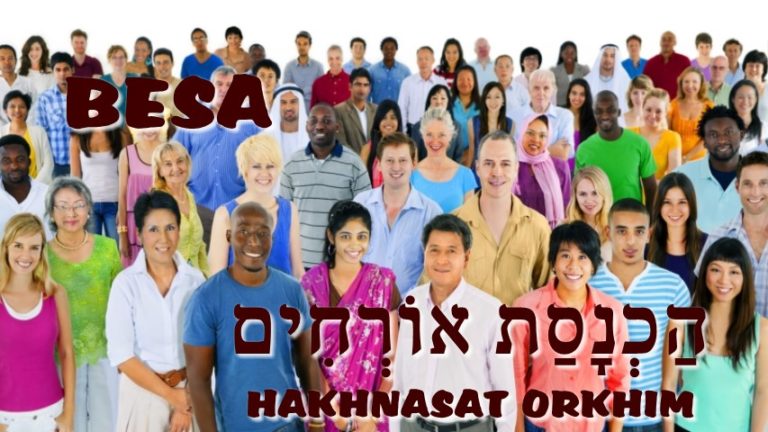You Never Know What a Guest Might Bring!
This d’rash was presented on Fri, Oct 26, 2018, at Temple Sinai in Stamford, CT, when Woodlands Community Temple was invited to participate in a spiritual-cultural exchange, sharing with them the music of our service, “A Joyful Noise,” as well as being led by our clergy team. On Fri, Dec 21, 2018, Temple Sinai will come to Woodlands and lead a Shabbat service featuring their clergy team and the music of their “Ruach” ensemble. A great blessing for us all!
Billy
This exchange, besides being a wonderful experience for all of us, especially for the clergy (who almost never get to see the inside of another temple), is also symbolically very powerful. Houses of worship of any religion tend to operate in their own little universe. And yet, our message is frequently about how we’re part of a larger community but, all too often, we remain secluded in the day-to-day of our own lives.
But this evening, our two synagogues have actually bridged the twenty-five miles between our spiritual homes and have found ourselves meeting one another, enjoying Shabbat together, and exchanging ideas about the synagogues we love.
Judaism teaches us that hakhnasat orkhim, welcoming visitors, is a mitzvah. “You shall love your neighbor as yourself,” we learn in Leviticus 19. Whether those we welcome into our homes are simply weary travelers or strangers in need, we are encouraged to make room for others.
In this week’s parasha, Vayera, Abraham meets and welcomes into his home three travelers who turn out to be messengers from God. They bear important news: first, that Abraham and Sarah will soon be blessed with the birth of their son, Isaac; and second, that the destruction of Sodom and Gomorrah is imminent, provoking Abraham to engage in the first act of Jewish social justice by lobbying God to spare the two cities.
Our lives are filled with routine. For most of us, we pretty much know what our days and our nights will look like even before our morning coffee. But hospitality – guests in our homes with whom we share what we have – can change up our routine. Granted, stories abound of house guests who are reminiscent of Michael Myers in Halloween but, hopefully, most such experiences become wonderful opportunities to meet interesting new people and hear about fascinating moments which we then either live vicariously or make plans to do ourselves.
 I was thinking of times, growing up in Cincinnati, when my parents opened our home to guests. I remember when I was really little that they often hosted parties during which I was ordered to stay upstairs and out of sight. Later, in my early teens, I remember my older brothers welcoming traveling hippies who would regale me with stories of their having attended Woodstock in 1969. But besides that, our house was most frequently a shelter for myriad cats and dogs. I couldn’t find a photograph from frequent times when entire litters of cats filled our home, but here are some snapshots of me and my siblings and some of the guests who stayed and stayed and stayed, teaching me important lessons in hospitality, about offering food, a place to rest, opportunities to get outside and play, and, of course, lots of love.
I was thinking of times, growing up in Cincinnati, when my parents opened our home to guests. I remember when I was really little that they often hosted parties during which I was ordered to stay upstairs and out of sight. Later, in my early teens, I remember my older brothers welcoming traveling hippies who would regale me with stories of their having attended Woodstock in 1969. But besides that, our house was most frequently a shelter for myriad cats and dogs. I couldn’t find a photograph from frequent times when entire litters of cats filled our home, but here are some snapshots of me and my siblings and some of the guests who stayed and stayed and stayed, teaching me important lessons in hospitality, about offering food, a place to rest, opportunities to get outside and play, and, of course, lots of love.
Hospitality is on many of our minds these days. Our world has grown harsher, and crueler, in the past few years. Even now, we’re watching nervously as the United States Army is called to turn away thousands of Central Americans who have been labeled as terrorists and hardened criminals but who look far more like concerned moms and dads trying to bring their frightened, hungry, tired children to a place of safety. I understand that borders need to be protected, but it sure does sadden me that our nation’s leadership would portray these folks in such an unfavorable light.
Among my very favorite hasidic stories is one that is told about Rabbi Moshe Leib, the 18th century Tzaddik of Sassov (now in Ukraine). Rabbi Moshe Leib was best known for his love of humanity. One dark night, the story goes, with a heavy snow falling outside, he heard someone tap at his window. Moshe Leib looked out and saw a strange man dressed in tatters, with lacerations on his hands and face, and a gleam of madness in his eyes. The rebbe hesitated for only a moment whether to let such a person into his house, but then thought to himself, “If there is room for someone like this in God’s universe, surely there is room for him in my home.” And with that, he opened the door wide and invited the man in.
I’m hopelessly moved by the plight of abandoned animals. Charlie is a beagle, basset hound mix who came to us from a kill shelter in South Carolina, flew in a private plane to New York where, at Pets Alive in Elmsford, New York (now Paws Crossed), we fell for him and, eight years ago, brought him forever into our home and our lives. Even while I care for my little mutt, I also watch videos from Paws for Hope that catalog the adventures of Eldad Hagar who rescues cats and dogs barely surviving in the streets and neighborhoods of Los Angeles, obtaining medical care for them, and finding homes where they can live in safety and be loved for the rest of their lives. I sit in front of my computer monitor, stunned by this man’s unbounded generosity of heart and time and, through my tear-soaked eyes, write check after check to thank him for providing hospitality that exceeds all reasonable expectations.
Then I think about Albania’s Muslims who, during World War II, not only succeeded in rescuing all of Albania’s 200 Jews, but another 1800 Jewish men, women and children, as Albania was one of the very few countries that kept its doors open to Jewish refugees. When the Nazis occupied Albania in 1943, the response was a uniform one: Besa. Besa means “faith,” or “to keep the promise,” and it reflects the Albanian Muslim idea that when one has welcomed a guest into your home, that guest is accorded all kindnesses and honors, including, if need be, the protection of their lives. When the Nazis came hunting for Jews, the Albanian Muslims embarked upon an ambitious national project: hide every one of them (including the additional 1800). Two thousand Jewish men, woman and children who, except for a single family, all survived.
Now that’s hospitality!
America isn’t perfect. God knows, there are chapters in our history for which we should hang our heads in shame: the near-genocide of this nation’s indigenous peoples, the kidnapping and enslavement of millions of Africans, the mistreatment of non-whites, of women, of the LGBTQ community and, yes, antisemitism. But enshrined within our Constitution are words that convey hope for our one day getting this right: “Congress shall have power to establish a uniform rule of naturalization” (Article 1, Section 8). Throughout the 242 years of its existence, America has opened its doors to immigrant populations who, again and again, would provide the energy and the will that would transform our nation into the great land it is today.
 But also enshrined in our laws was an insistence on welcoming those who are fleeing danger in their own lands. Since World War II, we can be proud that more refugees have been granted asylum in the United States than in any other nation. But today, applications for asylum are under siege, children are being taken from their parents, and deportations of current residents are occurring everywhere including, only eighteen miles from here, the caretaker of Temple Bet Torah in Mount Kisco where Armando Rugerio has worked for twenty years, raised two children, and now languishes in an Albany jail as he awaits a final determination of his fate.
But also enshrined in our laws was an insistence on welcoming those who are fleeing danger in their own lands. Since World War II, we can be proud that more refugees have been granted asylum in the United States than in any other nation. But today, applications for asylum are under siege, children are being taken from their parents, and deportations of current residents are occurring everywhere including, only eighteen miles from here, the caretaker of Temple Bet Torah in Mount Kisco where Armando Rugerio has worked for twenty years, raised two children, and now languishes in an Albany jail as he awaits a final determination of his fate.
Ours is a tradition that has always valued opening doors (or, if we’re Abraham and Sarah, opening tent flaps). When guests arrive, they may bring immediate blessing or complex challenge. It is our privilege to swing the door as widely open as we can, and respond as Rabbi Moshe Leib of Sassov did, “If there is room for someone like this in God’s universe, surely there is room for him in my home.”
Once again, we are so grateful you have welcomed us into your home. Not only is it a cherished blessing to spend this Shabbat with you, but it reminds us all how vital it is for us to welcome others whenever the need, or simply the opportunity, arises.
I once visited a synagogue in Italy and was asked by the rabbi to say a few words. I shared a funny anecdote about life in New York and, really digging into it, I embellished the story with lots of twists and turns before arriving to the punchline. The rabbi then translated it into Italian, but used only a few words to do so. Everyone laughed, so that was pretty great. After the service, I asked the rabbi how he managed to translate my lengthy story into such a compact retelling. “Well,” he said, “I didn’t think they’d get your point, so I just told them, ‘Our guest is trying to be funny. Everyone please laugh.’”
May we always be grateful for the opportunities life presents to meet new people and make new friends. We may not always understand each other, but we can always appreciate good intentions and the generosity of extending and of accepting invitations to share. Thank You for giving us abundant spirits and open minds, that we might always create spaces, both in our personal and our communal lives, to welcome both stranger and friend.
 Eloheinu v’elohei avoteinu v’imoteinu … dear God and God of our ancestors, God of New York and God of Connecticut, God of the Jews and God of the Muslims, God of the comfortable and God of the afflicted, what goodness You have implanted in Your magnificent world! May we open our homes, our towns, our nation, to ensure that all life is honored and protected. Regardless of differences between ourselves and our neighbors, may we understand that we’re not so different that we can’t look into the eyes of another and see the faces of our sisters and our brothers. May the people of our two synagogues always be among the Righteous of the Nations who stand up and proclaim, “Besa.” My word is my promise. My faith is my honor. Humanity is to be cherished. I will do so for each and every one of them.
Eloheinu v’elohei avoteinu v’imoteinu … dear God and God of our ancestors, God of New York and God of Connecticut, God of the Jews and God of the Muslims, God of the comfortable and God of the afflicted, what goodness You have implanted in Your magnificent world! May we open our homes, our towns, our nation, to ensure that all life is honored and protected. Regardless of differences between ourselves and our neighbors, may we understand that we’re not so different that we can’t look into the eyes of another and see the faces of our sisters and our brothers. May the people of our two synagogues always be among the Righteous of the Nations who stand up and proclaim, “Besa.” My word is my promise. My faith is my honor. Humanity is to be cherished. I will do so for each and every one of them.
Shabbat shalom.


Leave a Reply